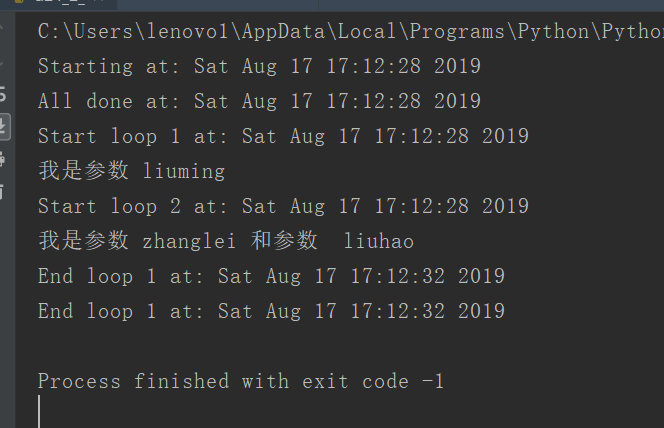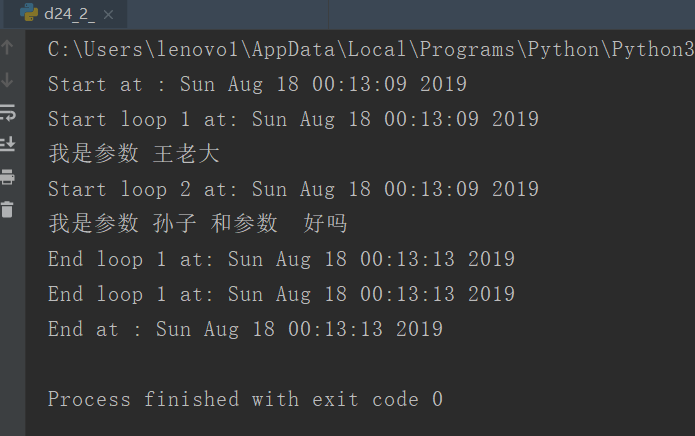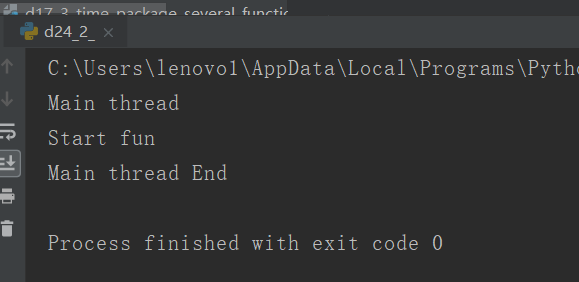жӮЁеҘҪпјҢзҷ»еҪ•еҗҺжүҚиғҪдёӢи®ўеҚ•е“ҰпјҒ
threadingж–№жі•жҖҺд№ҲеңЁPythonйЎ№зӣ®дёӯдҪҝз”ЁпјҹзӣёдҝЎеҫҲеӨҡжІЎжңүз»ҸйӘҢзҡ„дәәеҜ№жӯӨжқҹжүӢж— зӯ–пјҢдёәжӯӨжң¬ж–ҮжҖ»з»“дәҶй—®йўҳеҮәзҺ°зҡ„еҺҹеӣ е’Ңи§ЈеҶіж–№жі•пјҢйҖҡиҝҮиҝҷзҜҮж–Үз« еёҢжңӣдҪ иғҪи§ЈеҶіиҝҷдёӘй—®йўҳгҖӮ
дёҖгҖҒ дҫӢеӯҗпјҡжҲ‘们еҜ№дј еҸӮжҳҜжңүиҰҒжұӮзҡ„еҝ…йЎ»дј е…ҘдёҖдёӘе…ғз»„пјҢеҗҰеҲҷжҠҘй”ҷ
import _thread as thread
import time
def loop1(in1):
print("Start loop 1 at:", time.ctime())
print("жҲ‘жҳҜеҸӮж•°", in1)
time.sleep(4)
print("End loop 1 at:", time.ctime())
def loop2(in1, in2):
print("Start loop 2 at:", time.ctime())
print("жҲ‘жҳҜеҸӮж•°", in1, "е’ҢеҸӮж•° ", in2)
time.sleep(4)
print("End loop 1 at:", time.ctime())
def main():
print("Starting at:", time.ctime())
thread.start_new_thread(loop1, ("liuming", ))
# дёҠйқўжҲ‘д»¬дј еҸӮзҡ„ж—¶еҖҷпјҢ жҲ‘з”Ёзҡ„жҳҜпјҡпјҲвҖң liumingвҖқпјүпјҢ иҝҷйҮҢйқўжҳҜжІЎжңүйҖ—еҸ·зҡ„пјҢ з»“жһңзј–иҜ‘жҠҘй”ҷпјҢ е‘ҠиҜүжҲ‘пјҢ иҝҷйҮҢйқўеҝ…йЎ»дј е…Ҙе…ғз»„
# еӣ жӯӨпјҢ жҲ‘жүҚеңЁйҮҢйқўеҠ дәҶдёҖдёӘйҖ—еҸ·пјҢ дҪҝе…¶еҸҳжҲҗдёҖдёӘе…ғз»„
thread.start_new_thread(loop2, ("zhanglei", "liuhao"))
print("All done at:", time.ctime())
if __name__ == "__main__":
main()
while True:
time.sleep(10)
дәҢгҖҒthreadingзҡ„дҪҝз”Ё
зӣҙжҺҘеҲ©з”Ёthreading.Threadз”ҹжҲҗThreadзҡ„е®һдҫӢ
ж јејҸпјҡ
t= threading.Thread(target=еҮҪж•°дҪ“,args=(,))#еҸӮж•°argsиҰҒдј йҖ’е…ғз»„
t.start()#еҗҜеҠЁеӨҡзәҝзЁӢ
t.join()#зӯүеҫ…еӨҡзәҝзЁӢжү§иЎҢе®ҢжҲҗ
def main():
print("Start at :", time.ctime())
t1 = threading.Thread(target = loop1, args = ("зҺӢиҖҒеӨ§", ))
t1.start()# еҗҜеҠЁеӨҡзәҝзЁӢ
t2 = threading.Thread(target = loop2, args = ("еӯҷеӯҗ", "еҘҪеҗ—"))
t2.start()
t1.join()
t2.join()
print("End at :", time.ctime())
if __name__ == "__main__":
main()
д»ҺдёҠйқўеҸҜд»ҘзңӢеҮәжқҘпјҢжҲ‘们еҗҜеҠЁдәҶдёӨдёӘзәҝзЁӢпјҢдҪҶжҳҜиҝҷдёӨдёӘзәҝзЁӢжү§иЎҢе®ҢдәҶжүҚжү“еҚ°жңҖеҗҺдёҖдёӘз»“жқҹиҜӯеҸҘгҖӮ
2.е®ҲжҠӨзәҝзЁӢ
ж јејҸпјҡзәҝзЁӢ.setDaemon(True)
дҪңз”Ёпјҡ
пјҲ1пјүеҰӮжһңеңЁзЁӢеәҸдёӯе°ҶеӯҗзәҝзЁӢи®ҫзҪ®дёәе®ҲжҠӨзәҝзЁӢпјҢеҲҷеӯҗзәҝзЁӢдјҡеңЁдё»зәҝзЁӢз»“жқҹзҡ„ж—¶еҖҷиҮӘеҠЁйҖҖеҮәпјӣ
пјҲ2пјүдёҖиҲ¬и®ӨдёәпјҢе®ҲжҠӨзәҝзЁӢдёҚйҮҚиҰҒжҲ–иҖ…дёҚе…Ғи®ёи„ұзҰ»еӯҗзәҝзЁӢиҖҢзӢ¬з«ӢиҝҗиЎҢпјӣ
пјҲ3пјүе®ҲжҠӨзәҝзЁӢиғҪеҗҰжңүж•Ҳжһңе’ҢзҺҜеўғжңүе…ізі»
жіЁж„ҸзӮ№пјҡиҜҘиҜӯеҸҘдёҖе®ҡиҰҒеҶҷеңЁstartиҜӯеҸҘд№ӢеүҚпјҢеҗҰеҲҷе°ұдјҡжҠҠеӯҗзЁӢеәҸж— йҷҗж—¶й—ҙжҢӮиө·пјҢиҝҗиЎҢжҠҘй”ҷпјҢеҰӮпјҡ

def fun():
print("Start fun")
time.sleep(2)
print("End fun")
print('Main thread')
t3 = threading.Thread(target = fun, args = ())
t3.setDaemon(True)
t3.start()
time.sleep(1)
print("Main thread End")
зңӢе®ҢдёҠиҝ°еҶ…е®№пјҢдҪ 们жҺҢжҸЎthreadingж–№жі•жҖҺд№ҲеңЁPythonйЎ№зӣ®дёӯдҪҝз”Ёзҡ„ж–№жі•дәҶеҗ—пјҹеҰӮжһңиҝҳжғіеӯҰеҲ°жӣҙеӨҡжҠҖиғҪжҲ–жғідәҶи§ЈжӣҙеӨҡзӣёе…іеҶ…е®№пјҢж¬ўиҝҺе…іжіЁдәҝйҖҹдә‘иЎҢдёҡиө„и®Ҝйў‘йҒ“пјҢж„ҹи°ўеҗ„дҪҚзҡ„йҳ…иҜ»пјҒ
е…ҚиҙЈеЈ°жҳҺпјҡжң¬з«ҷеҸ‘еёғзҡ„еҶ…е®№пјҲеӣҫзүҮгҖҒи§Ҷйў‘е’Ңж–Үеӯ—пјүд»ҘеҺҹеҲӣгҖҒиҪ¬иҪҪе’ҢеҲҶдә«дёәдё»пјҢж–Үз« и§ӮзӮ№дёҚд»ЈиЎЁжң¬зҪ‘з«ҷз«ӢеңәпјҢеҰӮжһңж¶үеҸҠдҫөжқғиҜ·иҒ”зі»з«ҷй•ҝйӮ®з®ұпјҡis@yisu.comиҝӣиЎҢдёҫжҠҘпјҢ并жҸҗдҫӣзӣёе…іиҜҒжҚ®пјҢдёҖз»ҸжҹҘе®һпјҢе°Ҷз«ӢеҲ»еҲ йҷӨж¶үе«ҢдҫөжқғеҶ…е®№гҖӮ
жӮЁеҘҪпјҢзҷ»еҪ•еҗҺжүҚиғҪдёӢи®ўеҚ•е“ҰпјҒ